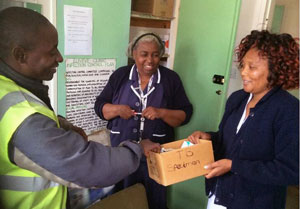- What We Do
- Agriculture and Food Security
- Democracy, Human Rights and Governance
- Economic Growth and Trade
- Education
- Ending Extreme Poverty
- Environment and Global Climate Change
- Gender Equality and Women's Empowerment
- Global Health
- Water and Sanitation
- Working in Crises and Conflict
- U.S. Global Development Lab

A network of motorcycles is used to quickly deliver sputum samples from clinics to be tested in laboratories.
Photo credit: TB Care
A reliable and efficient system for transporting TB specimens (e.g., sputum samples) is essential for effective TB patient care, allowing for more rapid diagnosis, initiation of treatment, and patient follow up.
Despite recent improvements in Zimbabwe’s TB laboratory infrastructure, a significant proportion of rural populations live far from sites where TB microscopy is performed. To address this bottleneck in TB diagnosis and care, USAID partnered with Zimbabwe’s existing transport system (Riders for Health) to launch a dedicated TB specimen transport system in three major cities in Zimbabwe, including the capital city of Harare.
Under this system, riders on motorcycles transport TB specimens from health facilities to diagnostic centers on a daily or weekly basis and deliver laboratory results back to the relevant health facilities. Due to this intervention, the time needed to provide an accurate TB diagnosis dropped from two to three weeks to only one to two days in urban settings and seven days in remote rural areas.
The transport system also generated renewed trust in the national health system among the communities served, which is essential in order for patients to seek treatment when they become ill. Following the successful completion of this three-city pilot project, USAID expanded the service to cover 24 districts. The system currently consists of 42 motorcycles which serve over 40 percent of Zimbabwe’s health establishments.







Comment
Make a general inquiry or suggest an improvement.